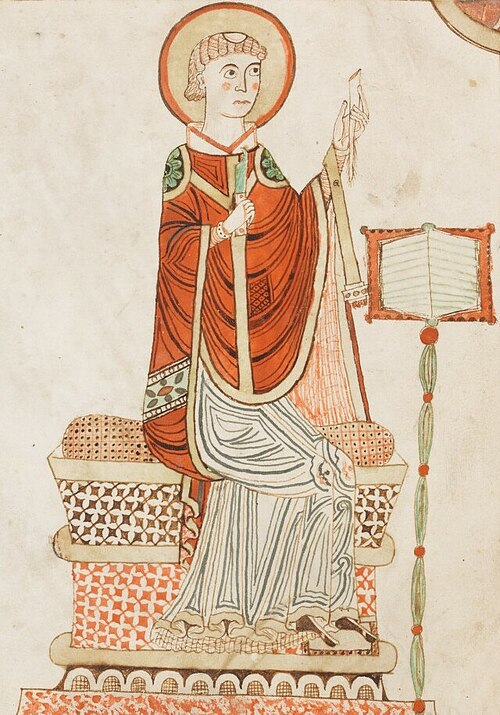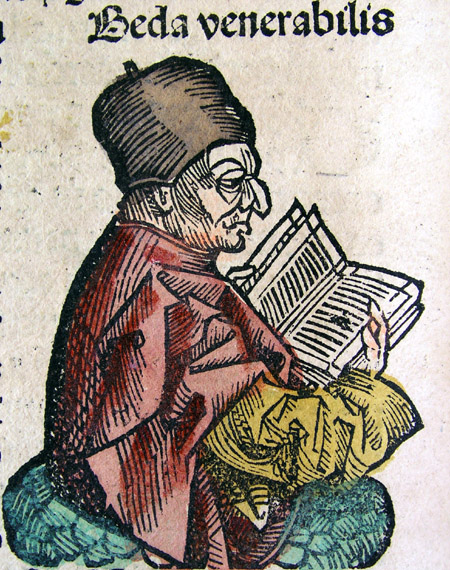
Catholic Saints
Saint Bede the Venerable (c. 673–735 AD), a monk at the twin monasteries of Jarrow and Wearmouth in Northumbria, England, emerged as a towering scholar and historian of the early medieval Church, earning the title “Venerable” for his profound wisdom and sanctity in an age of cultural rebirth following Roman withdrawal. Born into a turbulent Anglo-Saxon world, he spent his life in monastic seclusion, yet his intellectual reach extended far beyond, shaping Christian thought in Western Europe. A Doctor of the Church, Bede is celebrated for his Ecclesiastical History of the English People, a masterful chronicle that documented the spread of Christianity in Britain, blending meticulous research with theological insight. His extensive writings—commentaries on Scripture, scientific treatises like On the Reckoning of Time, and hymns—reflected a polymath’s curiosity, preserving classical knowledge while advancing computus (calendar science) that influenced the dating of Easter. Known for his humility and devotion, his feast day is celebrated on May 25, and he was named a Doctor of the Church in 1899 by Pope Leo XIII, leaving a legacy as the “Father of English History” whose scholarship illuminated the Dark Ages.
His feast day is celebrated on May 25.
Doctor of the Church
Born around 673 AD in Northumbria, Saint Bede the Venerable lived as a monk, weaving a legacy of scholarship and faith that illuminated the early medieval Church in Anglo-Saxon England.
Bede was born circa 673 AD near the twin monasteries of Wearmouth and Jarrow in Northumbria, a rugged Anglo-Saxon kingdom in northern England. Little is known of his family, but at age seven, he was entrusted to the care of Abbot Benedict Biscop, founder of Wearmouth, suggesting a modest background touched by piety. Raised amid the monastic revival spurred by Irish and Roman missionaries, he entered a world of books and learning rare for his time.
Educated in Latin and Greek by Biscop and later Abbot Ceolfrith, Bede absorbed the classics—Virgil, Pliny—and patristic works, shaping his intellect in a region still forging its Christian identity after the Synod of Whitby in 664 AD aligned it with Rome. This early immersion in a vibrant monastic culture laid the foundation for his lifelong devotion to study and prayer.
Bede spent his entire life within the walls of Jarrow, ordained a deacon at 19 and a priest at 30, never venturing far from his cloister. Yet his mind roamed widely, fueled by the monastery’s library—among the finest in Europe, thanks to Biscop’s travels. His days blended the Benedictine rhythm of prayer with tireless writing, producing over 60 works across theology, history, and science.
Living in a community of about 600 monks, Bede thrived in solitude, eschewing worldly ambition for intellectual pursuit. His humility shone in his self-description as a “servant of Christ,” a trait that earned him the title “Venerable” even in life, reflecting his peers’ awe at his wisdom and sanctity within the monastic enclosure.
Bede’s masterpiece, Ecclesiastical History of the English People, completed around 731 AD, chronicled the Christianization of Britain from Roman times to his own day. Drawing on oral traditions, letters, and Roman sources, he wove a narrative of kings, missionaries like Augustine of Canterbury, and saints, offering the first cohesive account of English identity rooted in faith.
His meticulous approach—cross-referencing dates and citing sources—set a new standard for historiography, earning him the title “Father of English History.” The work, translated into Old English by King Alfred, shaped national consciousness and remains a primary source for Anglo-Saxon studies, blending historical rigor with a providential view of God’s work in England.
Bede’s On the Reckoning of Time (c. 725 AD) revolutionized medieval science by refining the calculation of Easter, a contentious issue since the Synod of Whitby. Building on earlier computus texts, he introduced the Anno Domini (AD) dating system, popularizing Dionysius Exiguus’s method and standardizing Christian chronology across Europe.
The treatise also explored cosmology—tides, seasons, and the zodiac—merging theology with natural observation. His On the Nature of Things, a companion work, distilled classical science for monks, ensuring its survival. Bede’s calendrical precision influenced liturgy and scholarship, cementing his role as a scientific pioneer in an age of limited learning.
Bede’s biblical commentaries—on Genesis, the Gospels, Acts, and Revelation—filled over half his oeuvre, blending exegesis with pastoral care. Drawing on Augustine, Jerome, and Gregory the Great, he offered allegorical and literal interpretations, making Scripture accessible to monks and clergy. His work on the Vulgate improved its text, a labor of love completed on his deathbed.
His hymns and homilies, like the poem on Saint Cuthbert, enriched monastic worship, while treatises likeOn Orthography aided Latin education. Named a Doctor of the Church in 1899 by Pope Leo XIII, Bede’s scriptural voice resonated beyond Jarrow, guiding the faithful and preserving patristic wisdom for the medieval Church.
Bede died on May 26, 735 AD, at Jarrow, surrounded by his brethren, dictating his final translation of John’s Gospel. Buried in the monastery, his relics were later moved to Durham Cathedral in 1020 AD, where his tomb remains a pilgrimage site. His feast day, May 25, honors a life of quiet brilliance.
Saint Bede the Venerable’s legacy lies in his fusion of history, science, and theology. His Ecclesiastical History inspired chroniclers like William of Malmesbury, while his computus shaped Western timekeeping. Revered as “Venerable” for his sanctity, his scholarship illuminated Anglo-Saxon England, earning him a place as a Doctor of the Church and a beacon of learning in a nascent Christian world.
“Christ is the morning star, who, when the night of this world is past, brings to his saints the promise of the light of life.”
Born in Northumbria.
Entered Wearmouth monastery.
Began monastic service.
Became a deacon.
Ordained Priest.
Deepened scholarly work.
Completed major work.
Finished Ecclesiastical History.
Died at Jarrow.
Named Doctor of the Church in 1899.

“Christ is the morning star, who, when the night of this world is past, brings to his saints the promise of the light of life.”
Saint Bede the Venerable Quotes
“The life of man is of a short duration, and all that is past is gone like a shadow.”
“He alone loves the Creator perfectly who manifests a pure love for his neighbor.”
“The study of Scripture is the nourishment of the soul, leading us to eternal truth.”
“Time is a gift from God, to be measured and used for His glory.”
“The Church is the ark of salvation, carrying us through the storms of this world.”
“Learning is a light that dispels the darkness of ignorance and reveals the beauty of truth.”